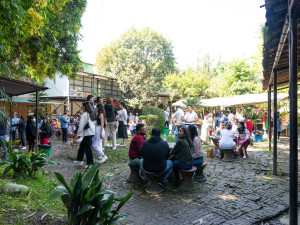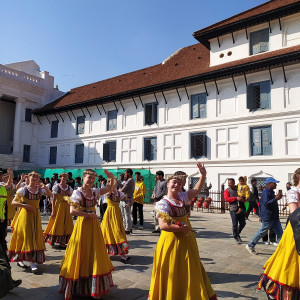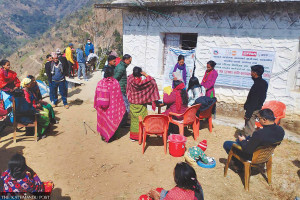 16.12°C Kathmandu
16.12°C KathmanduCulture & Lifestyle
A Nepali brand’s commitment to ethical fashion
Kallisto Designs specialises in hand-painted silk products, with founder Anu Shrestha leading the charge to highlight Nepali hand-painting in the world of design.
Manushree Mahat
Anu Shrestha knew she had a knack for the arts at a young age. Her mother’s artwork and self-sewed dresses were all part of her colourful childhood. Embracing her passion, she pursued a journey into the world of fashion, where she found true fulfilment. “I’m pleased that I chose a path in fashion; it has been a rewarding journey,” says Shrestha. Currently, she is the founder of Kallisto Designs, a sustainable-ethical Nepali brand championing local craftsmanship. Kallisto Designs is known for its silk products, showcasing hand-painted Nepali designs.
Shrestha’s earliest memory revolves around her mother crafting dolls, with Shrestha closely observing every move. Eventually, she, too, began spending a lot of her time drawing and crafting different things. While it wasn’t her initial pursuit, she found herself delving into the world of fashion design at South Delhi Polytechnic College, India, in 1994.
After completing her degree, she returned to Nepal and began working at a company where she learned the many facets of fashion. It was here that she became highly involved in the design, client meetings and quality production aspects of the industry. After the company decided to discontinue further production, she founded Kallisto Designs in 2016 with the team she had been working with for years.
Shrestha never saw herself as an entrepreneur until she found herself in charge of an entire company. “I thought I’d be happy just designing and freelancing, and I’d have free time,” she says. However, when presented with the opportunity to lead Kallisto Designs, she embraced the challenge.
“I consider myself fortunate to have a team I’ve worked with for years. Together, we worked hard to establish our presence in the Nepali fashion scene,” says Shrestha.

Starting Kallisto Designs with the aim of promoting Nepali crafts and design globally, Shrestha envisioned a sustainable and ethical brand in an industry dominated by fast fashion. Her focus was on placing Nepali hand-painting at the forefront of design. All products, including the paintings and chemicals used in manufacturing, are eco-friendly. Furthermore, Shrestha is mindful of her artists and craft people’s well-being.
“I always encourage my customers to reuse the sarees and kurtas we create here. These products are of high quality and suitable for numerous occasions. I even teach them different ways to drape the sarees with embellishments, encouraging them to wear them again,” says Shrestha.
She also believes that consumers are gradually becoming more open to sustainable and ethical fashion options over time.
For Shrestha, designing is about bringing imagination to life. When a design comes to mind, she discusses her plans with her team, and together, they start working on producing samples. Subsequently, they collaborate to determine which design suits various fabrics for their collection.
When asked about memorable experiences from her many years in the fashion industry, Shrestha struggled to pick just one. For her, every fashion show, ramp walk, and encounter with models is a chance to learn something new. She vividly recalls her first designs and their wearers and cherishes each subsequent design. For a designer, every fabric and design holds significance, says Shrestha.
Kallisto Design’s signature lies in hand-painted silk designs. Shrestha appreciates the glamour and elegance of silk, making it a joy to work with each time. Having seen her mother wear silk often while growing up, it holds a special place for her. Despite a desire to expand to cotton for summer demands, finding an eco-friendly option comparable to silk has proven challenging.
Shrestha has observed a significant evolution in Nepal’s fashion scene since she began working as a designer. The standards have risen, and there’s a positive outlook for the future of sustainable fashion. Increasingly, consumers are recognising and supporting local Nepali brands that produce quality products.
While fashion schools in Nepal are improving, up-and-coming designers still face challenges in establishing themselves. To address this, Shrestha has taken on a role as a board member of the recently registered Fashion Designing Centre Nepal (FDCN). The FDCN aims to provide a platform for new designers, offering them access and exposure to the market. Shrestha envisions this initiative turning competition among designers into collaboration.
Shrestha never pursued a specific goal; she simply continued doing what she loved and enjoyed working on. She believes that consistently demonstrating hard work and dedication to your craft pays off, and eventually, people will start recognising your potential.








.jpg&w=200&height=120)












